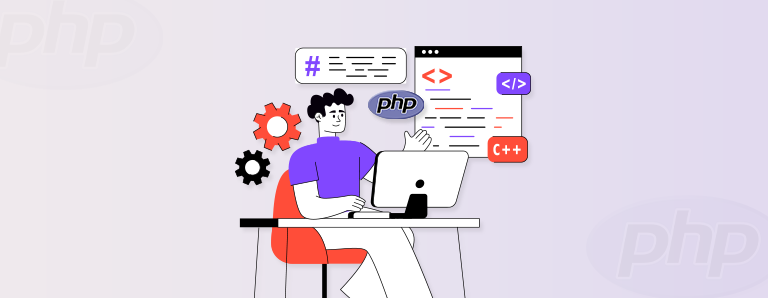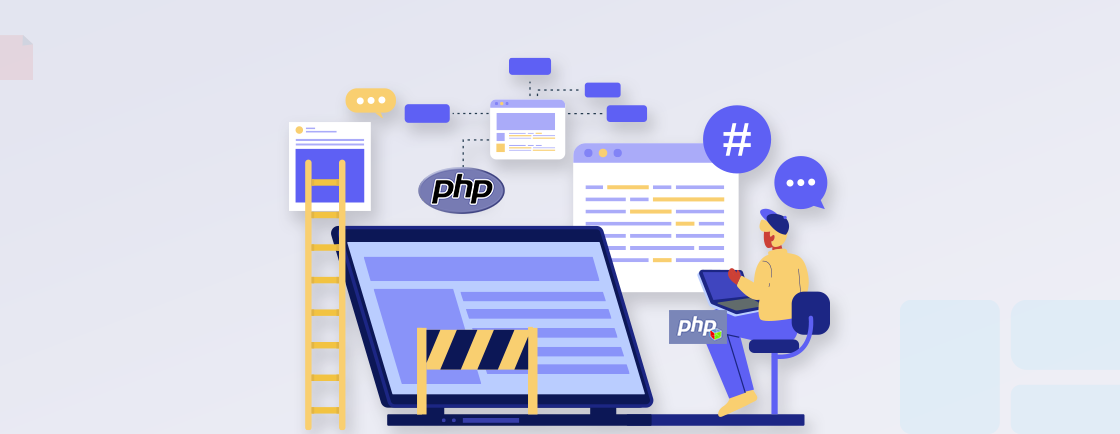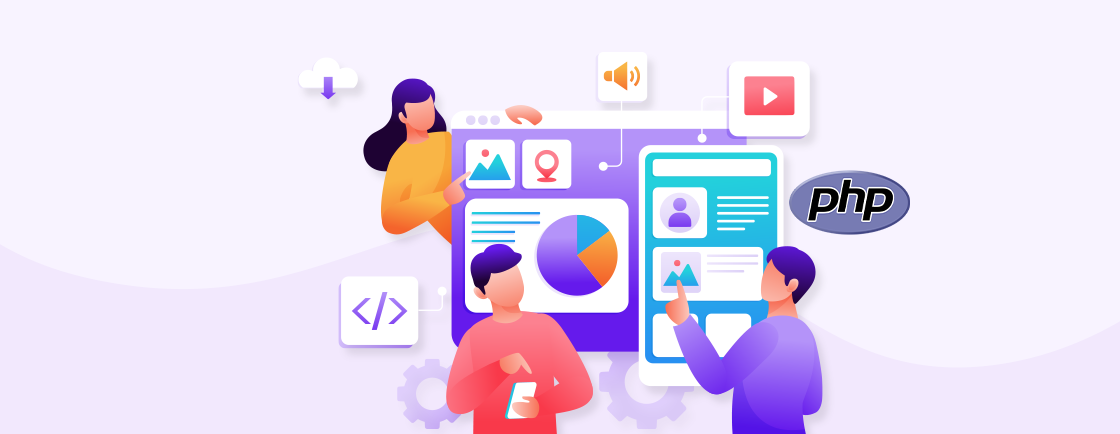Table of Contents
The world of web development succeeds based on skilled individuals who can turn ideas into functional and engaging online experiences. For those drawn to server-side programming, PHP is a powerful and versatile language. But what does it take to become a PHP expert?
Beyond the initial coding knowledge, mastering a specific set of core skills is important. These skills serve as the building blocks for building secure, efficient, and user friendly web applications. From understanding programming concepts to guiding the world of frameworks and version control, mastering these essentials helps PHP developers excel in the digital landscape.
Let’s dive into the must-have skills to thrive in the world of PHP development. We’ll explore everything from core language fundamentals to advanced techniques. This will ensure you have the knowledge and tools to build web applications while improving them as per evolving user needs.
What are PHP Developer Skills?
PHP developer skills encompass the technical expertise and problem-solving abilities required to build user friendly web applications. These skills act as the building blocks for navigating the complexities of modern web development.
Common PHP Developer Skills:
- Core PHP Proficiency. This forms the foundation. It includes an understanding of syntax, control flow structures, and functions.
- Front-end Technologies. While PHP focuses on the server side, a grasp of HTML, CSS, and JavaScript also holds importance. They are the most important languages to understand how the front end and back end interact.
- Database Management. Effective interaction with databases, like MySQL, is important for storing and retrieving data. It allows applications to function seamlessly.
- PHP Frameworks. Use PHP frameworks like Laravel and Symfony. Each of them streamlines development by providing pre-built functionalities and enforcing coding best practices.
By mastering these core areas, you can gain the necessary tools. It helps in not only building web applications but also maintaining, troubleshooting, and optimizing them for performance and security. If you’re looking to turn ideas into powerful, secure, and scalable web solutions, our expert PHP development services can help you in building custom application.
What are the Must Skills to Have as a PHP Developer?
Developers need to master a specific set of skills. These essential skills include various aspects of development. Everything from laying the foundation with core PHP knowledge to collaborating can ensure optimal performance. Let’s dive into each of these must-have skills:
1. Core PHP
Mastering the fundamentals of core PHP is vital to building a strong foundation for your web development. These foundational aspects equip you with the aspects necessary to construct secure and user friendly web applications. Here’s a breakdown of the must-have core PHP understandings:
- Syntax. Grasp the fundamental rules of writing PHP code, including variables, operators, control flow statements, and conditional logic. These elements are important for communicating instructions within the application.
- Data Types. Understand PHP data types such as integers, strings, arrays, and objects. Knowing how to use and manage these data types is important for storing, processing, and displaying information within your applications.
- Functions. Master the creation and use of PHP functions. These reusable blocks of code promote code organization, improve maintainability, and improve overall code efficiency.
- Object-Oriented Programming (OOP). Gain proficiency in PHP OOP principles like classes, objects, and inheritance. This is a bit more complex but by structuring your code using these principles, you ensure its maintainability and scalability. This allows your applications to adapt and grow with ease.
By solidifying your understanding of these core concepts, you’ll be well-equipped to tackle more complex coding challenges.
2. Front-End Technologies
Indeed, PHP benefits unparalleled on the server side. However, creating a user experience requires stepping into front-end technologies. Understanding these technologies empowers you to bridge the gap between the server and the user. That means more visually appealing and interactive UIs.
- HTML. This fundamental language forms the structure and content of web pages. Mastering HTML benefits in creating the basic building blocks of your application’s user interface.
- CSS (Cascading Style Sheets). CSS controls the presentation of your web pages. It allows you to define styles for layout, fonts, colors, and more. Mastering CSS is important for crafting visually appealing and user friendly interfaces.
- JavaScript. This scripting language adds interactivity to web pages. Understanding JavaScript enables you to implement features like animations, form validation, and user interactions, improving user interaction.
You must have a strong understanding of these front-end technologies. With an in-depth understanding, you’ll be able to collaborate with front-end web designers and ensure a seamless user experience within your PHP applications.
3. Database Management
In today’s data-driven world, understanding database management is essential for any PHP developer. Databases act as the storage houses for your application’s vital information. It includes everything from user accounts to product details.
- Store and Retrieve Data. Store and retrieve data from the database, ensuring information is available for your application to function.
- Utilize SQL (Structured Query Language). Grasp the fundamental queries in SQL, a powerful language designed for interacting with relational databases. Mastering SQL allows you to fetch, manipulate, and manage data within your applications.
- Choose the Right Database. Select the appropriate database management system (DBMS) based on your project’s specific needs and requirements. Popular choices include MySQL, PostgreSQL, and NoSQL databases.
- Maintain Data Integrity. Implement best practices to ensure data accuracy, consistency, and security within your applications.
With these essential database management concepts covered, you’ll unlock the power of data. Thus, enables your PHP applications to handle big data information and deliver exceptional user experiences.
4. PHP Frameworks
While core PHP knowledge forms the foundation, PHP frameworks take your development capabilities to the next level. These frameworks are pre-built collections of code. It provides functionalities and structure, streamlining the development process and enforcing best practices. Here’s a breakdown of the must-have PHP framework understandings:
- Purpose and Benefits. Understand the purpose and benefits of using PHP frameworks. You can count on factors like faster development and access to pre-built functionalities.
- Popular Frameworks: Familiarize yourself with popular options like Laravel, Symfony, and CodeIgniter. Each framework offers unique features and caters to different project needs.
- Framework Structure. Gain a basic understanding of the framework’s structure. Make sure your chosen framework includes components, routing, and templating systems. This knowledge will enable you to steer and use the framework’s functionalities.
- Best Practices. Learn and adhere to best practices within your chosen framework. It ensures your code adheres to established conventions and promotes collaboration and maintainability.
Understanding these PHP frameworks is important to turn any web development idea into reality. By grasping a familiarity with them, you build efficient, robust, and scalable PHP applications.
5. Version Control Systems
Version control systems (VCS) are fundamental tools for any developer, especially in the collaborative environment of PHP development. These systems act as a repository, facilitating collaboration, and enabling effortless rollbacks when needed. To leverage VCS, a strong understanding of the following is crucial:
- Fundamentals. Grasp the core concepts of versioning, committing changes, branching and merging strategies, and conflict resolution techniques.
- Popular Systems. Familiarize yourself with widely used VCS like Git, particularly in the PHP community. Understanding Git’s basic commands is essential for interacting with codebases and collaborating.
- Workflow Integration. Integrate your chosen VCS into your development workflow. This facilitates code change tracking, smooth collaboration, and ensures a streamlined development process.
- Benefits. Using VCS offers improved collaboration through shared history and efficient conflict resolution. This also benefits in improving the code quality. It gets it done through rollback capabilities through branching and merging.
By mastering these fundamental VCS concepts, you’ll be well-equipped to navigate the landscape of PHP development. Also, this will help you to maintain code integrity, change history, and achieve smoother web development process.
6. PSR Coding Standards
The PHP development succeeds in consistency and collaboration. Enter PSR (PHP Standard Recommendations). It is a set of guidelines that define coding styles and best practices for PHP development. By adhering to PSR standards, you contribute to creating code that is:
- Consistent Code Formatting. PSR standards are specific formatting rules for indentation, spacing, and line breaks. This consistency improves code readability and maintainability for yourself and other developers.
- Improved Collaboration. By adhering to PSR standards, you contribute to a universal language within the PHP community. It fosters better collaboration as everyone involved understands the code structure. This makes teamwork more efficient.
- Reduced Errors. PSR standards often recommend specific approaches to common coding tasks. This reduces the likelihood of introducing errors or inconsistencies through individual stylistic choices.
Familiarize yourself with PSR standards. It must include PSR-1 (Basic Coding Standard) and PSR-2 (Coding Style Guide. This is a valuable step towards mastering the essentials of PHP development.
7. Caching Techniques
For developers, ensuring the PHP application performance is paramount. Caching techniques go beyond simply “saving data”. It dives into strategic data storage methods to optimize application speed and efficiency.
- Reduced Server Load. Caching frequently accessed data, like database queries or complex calculations. It acts as an available source, minimizing the need for the server to process the same information. This frees up server resources, allowing it to handle more requests.
- Improved User Experience. Faster page load times, a direct consequence of caching, improve user experience. Users appreciate websites that respond promptly, and caching plays a key role in achieving that goal.
- Performance Optimization. By deploying caching techniques, you can boost the overall performance of your PHP applications. This translates to faster response times, improved scalability, and a smoother user experience.
Consider using caching strategies like opcode caching. This will equip you with tools to optimize your PHP applications and deliver superior performance. By understanding how data is stored and retrieved, you can master efficiency in PHP development.
8. Profiling and Optimization Tools
PHP developers rely on profiling and optimization tools. It identifies performance bottlenecks within the applications. Mastering PHP development necessitates an understanding of these tools and their functionalities.
- Identify Performance Issues. Profiling tools analyze your code’s execution. Then it pinpoints areas that consume excessive resources or take longer to process. By identifying these bottlenecks, you can focus your optimization efforts on the most impactful areas.
- Measure Code Execution Time. By measuring the execution time of code, you gain an understanding of your application’s performance. This allows you to focus on optimization efforts and track the effectiveness of implemented changes.
- Compare Performance. Profiling tools enable you to compare the before and after optimization efforts. This provides quantifiable evidence of the effectiveness of your optimization strategies.
With popular profiling tools like Xdebug or Blackfire, you can analyze your code’s performance. It also benefits in identifying areas for improvement and delivering optimized PHP applications.
9. API Development
In today’s interconnected world, maintaining security in your PHP application is most important. Input validation and sanitization are the tools you can consider to integrate. This will ensure the safety and integrity of your PHP applications.
- Preventing Malicious Input. Validation ensures that user input adheres to predefined rules. This helps prevent malicious code injection attempts. Hence, benefits in protecting your application and user data from security vulnerabilities.
- Data Integrity. Sanitization removes or modifies harmful characters from user input. This procedure gets completed before it’s processed by live on the application. This safeguards the integrity of your data and prevents unexpected behavior or errors.
- Improved User Experience. With this method, you can provide user-friendly error messages when invalid data is entered. This helps users correct their mistakes and ensures a smoother experience.
You master input validation and sanitization techniques using functions like filter_var and htmlspecialchars. Integrating these functionalities you can build secure and reliable PHP applications. While also assuring the user input while preserving data integrity and user experience.
Conclusion
By mastering the essential skills outlined in this guide, you’ll be well-equipped to understand PHP development in-depth. Also, by leveraging these functionalities on a regular basis you can create robust, efficient, and user-friendly web applications.
Remember, this journey is an ongoing process. As the landscape of web development evolves, so too should your skillset. Embrace continuous learning, explore new technologies, and stay up-to-date with the latest trends.
Want to bring your project to life faster and smarter? Hire dedicated PHP developers to deliver secure, scalable, and high-performance solutions tailored to your needs.
FAQs About Mastering Essential PHP Developer Skills
What are the best practices for database management in PHP development?
Secure your application by using prepared statements to prevent SQL injection attacks. Optimize your queries by using indexes and reducing unnecessary database calls. Implement PHP error handling to manage database issues and avoid exposing sensitive information.
How can I ensure compliance with PSR Coding Standards in PHP projects?
Adhere to the PSR guidelines, which promote code consistency and readability. Use coding style checkers like PHP CodeSniffer to identify and rectify violations. Integrate the standards into your development workflow for a consistent and maintainable codebase.
What are the most effective caching techniques for optimizing PHP applications?
Implement in-memory caching solutions like Redis or Memcached. These tools will store frequently accessed data for faster retrieval. Consider content delivery networks (CDNs) to cache static content. It helps in delivering content geographically using distributed servers for faster user experiences.
Master PHP Web Development
Access expert guides and tips to enhance your PHP programming capabilities.





